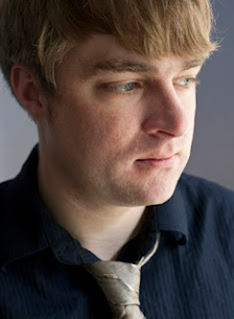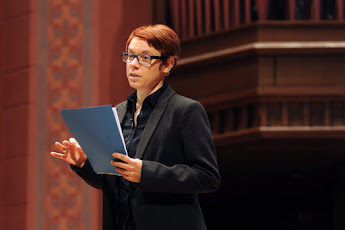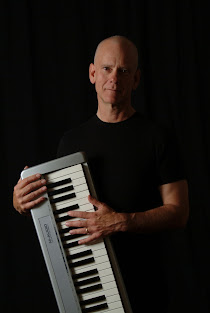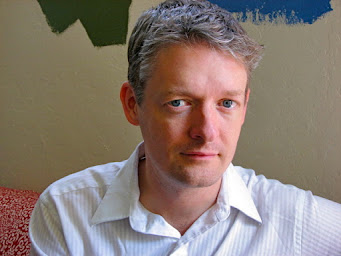Chamber Musicians of the Slee Sinfonietta offer a tribute to Robert Phillips (1981-2023)
Robert Phillips, Rutaceae (2015)
Rutaceae, for bass clarinet and fixed media, commissioned by and written for Heather Roche, features audio material comprised of hundreds of samples from a recording of her interpretation of Martin Iddon’s Ptelea, on May 9, 2014, in Leeds, UK. Though Iddon’s Ptelea is named after a tree nymph who bonded to an elm tree, the word also describes a genus of plants in the citrus family – the latin family name of the genus being Rutaceae.
This plant family name, Rutaceae, is also known as Rue, and is associated with remorse and regret, as in Shakespeare’s Richard II, “Here did she fall a tear, here in this place, I'll set a bank of rue, sour herb of grace." Rue is also a verb that has fallen into disuse: to feel sorrow over, repent of, regret bitterly.
To rue contrasts strongly with the dark flavor of guilt – rather, it is to have a soft awakening to our complete past and present, to recognize hurt, to gently plant a seed with our tear. Like a knock at the door of the psyche’s growth, repentance is an invitation to forfeit the struggle to deny the pain we have caused ourselves and others, and an overture to exhale into relief, without shame, and gaze upon the flower of remorse as it blooms.
– Robert Phillips
Eric Moe, What Instruments We Have Agree (2015)
W. H. Auden, In Memory of W.B. Yeats
These lines from Auden’s elegy for Yeats came to me when I heard about the death of my friend Lee Hyla. They (along with the rest of that wonderful poem) kept running through my head as I was composing the piece. Similarly pervasive was a wailing bass clarinet riff from Lee’s House of Flowers which insinuated itself into my piece. I have drawn considerable comfort in this time of grief from Lee’s extraordinarily vivid, profound, inspiring music.
What Instruments We Have Agree was written for the superb musicians of counter)induction and was completed in April 2015.
– Eric Moe
Robert Phillips, Larghetto Rubato (2010)
Larghetto Rubato, for bassoon, guitar, and cello, was originally composed for Pascal Gallois, Magnus Andersson, and Rohan de Saram when they visited the University at Buffalo in 2010 to perform works by University at Buffalo graduate composers and present their own program. Since then, the trio has toured the piece many times in Scandanavia, including at the most recent Kalvfestivalen in Sweden.
Larghetto Rubato plays with the relationship between the small spontaneous variations in tempi, the “rubato” which robs from the beats and rhythms around it, and the glissandi drifting of the melody. Each sonic element rises and falls, increases and decreases, and coordinates its movements like a net floating on water, loosening and tightening with the passing of each wave, as each wave gently distorts the temporal and harmonic surface.
– Robert Phillips
Paula Matthusen, between the smell of dust and moonlight (2016)
between the smell of dust and moonlight engages with the idea of the gradual evolution of space and the multiple roles it may serve. Commissioned by the Metropolis Ensemble in 2016 specifically for the Phillips Collection, the piece draws on its present incarnation as renowned art museum as well as the traces of its domestic past, as evidenced by it unique doorways and fireplaces.
For the premiere performance, the multi-movement work was dispersed through multiple rooms of the Phillips Museum, with three separate trios staged in different areas. Additionally, the Metropolis Ensemble navigates the museum as part of the piece, which doubles in part as a sound installation, with recordings placed in the multiple fireplaces of the space. The musicians use their instruments to interact with the space and archival recordings from the time period of the museum’s founding, as well as recent field recordings. The performers perform on a wide variety of recording formats as well, from early 78s played back on DIY phonographs, to dictaphones, and to transducers resonating through percussion instruments. The audience, beginning in the Music Room, was encouraged to follow the musicians on their various paths and to listen in on different spaces, before returning to the Music Room for the final trio.
The separate movements of between the smell of dust and moonlight have been excerpted for separate performance. The most recent of these was the final trio, which was rerecorded and reorchestrated with video for the online performance organized by Metropolis Ensemble entitled Free Assembly.
The title is drawn from Don Hertzfeldt’s film It’s Such a Beautiful Day. Special thanks to Andrew Cyr, Nestor Prieto for his technical and research assistance, as well as to Erik DeLuca for his experiments with early recording technologies.
– Paula Matthusen
Robert Carl, Piano Quartet “Just Listen”
My colleague and friend David Macbride died suddenly in his sleep on September 7, 2018, at the very start of classes at the Hartt School, where we both taught. We had known each other since Fall 1984, the date we both arrived as novice faculty members. No one expected this. David was a strong, often quiet presence that grounded our community with his devotion to students, the sacrament of performance, and the mandate to write music that demanded attention because of its sincerity, craft, and essential economy.
This work was written in a rush of energy and disorienting despair in fall 2018. The first movement channels that state, as well as being an evocation of being suddenly whisked from life before one would be properly aware of it. The middle movement was written first, then the fragmentary movements bordering it were added to build outwards from either end. In the fifth and final movement, the work folds in on itself in a shadow play of memory and stasis.
[The piece reflects on David's creative persona in several ways:
--David loved the music of Cage. Thus the second and fourth movements are each extremely spare, surrounded by silence. Their timings, 43" and 33" bear a reference to the seminal 4'33". A percussive sound in the fourth also makes a subtle reference to David's love and mastery of percussion writing.
--He also loved Morton Feldman (I do too), and this influence is clear throughout the piece, but especially in the third movement.
--And he played the viola. A cadenza for the instrument is featured in the center of the third movement.]
Above all, David was a musician who believed in his ear and his gut. I think that I, one who often loves to explore architectures that to me feel mystical, probably amused him with what he might have felt was incipient grandiosity. In respect to his values, this piece was written with almost none of the advance planning and exploration that usually prepares a work of mine. Instead, I allowed David to look over my shoulder and at times gently correct me if I got out of hand. He was saying:
Just listen.
–Robert Carl
COMPOSER BIOGRAPHIES
He writes regularly on new music in a variety of forums and magazines, and is
the author of Terry Riley’s In C (Oxford University Press). In
2016 Bloomsbury Press released Jonathan Kramer’s posthumous text Postmodern
Music, Postmodern Listening, which Mr. Carl edited. In fall 2020 Bloomsbury
also published a book of his essays titled Music Composition in the 21st Century:
A Practical Guide to the New Common Practice.
He was chair of Composition at the Hartt School, University of Hartford until Spring 2022. In Fall 2022 he was Slee Professor of Music at the University at Buffalo.
Paula
Matthusen is a composer
who writes both electroacoustic and acoustic music and realizes sound
installations. In addition to writing for a variety of different ensembles, she
also collaborates with choreographers and theater companies. She has written
for diverse instrumentations, such as “run-on sentence of the pavement” for
piano, ping-pong balls, and electronics, which Alex Ross of The New Yorker noted as being “entrancing”. Her work
often considers discrepancies in musical space—real, imagined, and remembered.
Her music
has been performed by Dither, Mantra Percussion, the Bang On A Can All-Stars,
Alarm Will Sound, International Contemporary Ensemble (ICE), orchest de
ereprijs, The Glass Farm Ensemble, the Estonian National Ballet, James Moore,
Kathryn Woodard, Todd Reynolds, Kathleen Supové, Margaret Lancaster and Jody
Redhage. Her work has been performed at numerous venues and festivals in
America and Europe, including the Tanglewood Festival of Contemporary Music,
the MusicNOW Series of the Chicago Symphony Orchestra, the Ecstatic Music
Festival, Other Minds, the MATA Festival, Merkin Concert Hall, the Aspen Music
Festival, Bang on a Can Summer Institute of Music at MassMoCA, the Gaudeamus
New Music Week, SEAMUS, International Computer Music Conference and Dither’s
Invisible Dog Extravaganza. She performs frequently with Object Collection, and
through the theater company Kinderdeutsch Projekts.
Awards include the Walter Hinrichsen Award from the American
Academy of Arts and Letters, a Fulbright Grant, two ASCAP Morton Gould Young
Composers’ Awards, First Prize in the Young Composers’ Meeting Composition
Competition, the MacCracken and Langley Ryan Fellowship, the “New Genre Prize”
from the IAWM Search for New Music, and recently the 2014 Elliott Carter Rome
Prize. Matthusen has also held residencies at The MacDowell Colony, Yaddo,
create@iEar at Rensselaer Polytechnic Institute, STEIM, and the Atlantic Center
for the Arts. Matthusen completed her Ph.D. at New York University – GSAS. She
was Director of Music Technology at Florida International University for four
years, where she founded the FLEA Laptop Ensemble. Matthusen is currently
Associate Professor of Music at Wesleyan University, where she teaches
experimental music, composition, and music technology, and she is the current
holder of the Visiting Slee Professorship at UB.
Eric Moe,
composer of what the NY Times has called “music of winning exuberance,” and
recently described by his physician as a “pleasant male in no acute distress”,
has received significant recognition for his work, including awards from the
American Academy of Arts and Letters and a Guggenheim Foundation; multiple
commissions from the Fromm and Koussevitzky Foundations, the Barlow Endowment,
Meet-the-Composer USA, and New Music USA; fellowships from the Pennsylvania
Council on the Arts; and residencies at MacDowell, Montalvo Arts Center, Yaddo,
Bellagio, Camargo, VCCA, UCross, Aaron Copland House, Ragdale, Hambidge, the
Carson McCullers Center for Writers and Musicians, Avaloch Farms, and the
American Dance Festival, among others.
Tri-Stan, his one-woman opera on a text by David Foster Wallace, was hailed by the New York Times as “a tour de force” that “subversively inscribes classical music into pop culture.” A recording is available from Koch International Classics. One review of his latest CD, Uncanny Affable Machines (New Focus Recordings), finishes up with “Killer stuff that feels like thinking man’s music”. Strange Exclaiming Music (Naxos) was described in Fanfare as “wonderfully inventive, often joyful, occasionally melancholy, highly rhythmic, frequently irreverent, absolutely eclectic, and always high-octane music.” Kick & Ride (bmop/sound) was a WQXR album of the week: “…it’s completely easy to succumb to the beats and rhythms that come out of Moe’s fantastical imaginarium, a headspace that ties together the free-flowing atonality of Alban Berg with the guttural rumblings of Samuel Barber’s Medea, adding in a healthy dose of superhuman strength.” Other portrait CDs include Meanwhile Back At The Ranch (New World Records), Of Color Braided All Desire, Kicking and Screaming, Up & At ‘Em, Siren Songs (Albany Records), and On the Tip of My Tongue (Centaur).
Moe founded and currently co-directs Pittsburgh’s Music on the Edge new music concert series. He studied at Princeton University and U.C. Berkeley. He is currently the Andrew W. Mellon Professor of Composition and Theory at the University of Pittsburgh and has held visiting professorships at Princeton University and the University of Pennsylvania, in addition to the Visiting Slee Professorship at UB for the spring semester of 2022.
Source: (https://www.ericmoe.net/)
MEET THE ARTISTS
Brian Patrick Caswell is a composer and organist. His diverse performance experience includes serving as a church organist in Phoenix, NY and Watertown, NY, as well as playing keyboards in jazz, rock, and funk bands in Syracuse, Rochester, Buffalo and New York City. Brian is currently a Ph.D. student in composition at SUNY University at Buffalo.
Violist Leanne Darling reaches across many genres to create a powerful new voice for the viola. Leanne holds degrees from the Eastman School of Music and Cleveland Institute of Music and has held principal and assistant principal positions in the Florida West Coast Symphony and the Missouri Chamber Orchestra. Specializing in Classical Arabic music as well as Jazz and European classical music, she combines styles to create repertoire for solo viola and loops generating layers of sound that simulates a whole room full of musicians. During her time as a freelancer in New York City she collaborated with oudist Simon Shaheen in Carnegie Hall, with poets Robert Bly and Clarissa Pinkola-Estes at the Omega Institute, and with the Cedar Lake Ensemble's premiere performance in Chelsea. As a composer, Ms. Darling’s work earned many Meet the Composer grants and earned her the New York Innovative Theater Award for best original music in 2007. Leanne currently teaches viola and chamber music at the University at Buffalo and leads improvisation workshops in the Buffalo area.
Nicholas Emmanuel holds a PhD in historical musicology and a masters’ degree in piano performance from the University at Buffalo. He has studied piano under Eric Huebner, Natalie Phillips, Maria Clodes-Jaguaribe, Oksana Lutsyshyn, and Lee Jordan Anders. He is active as a performer and educator in the Western New York area, where he strives to promote new music and the work of young composers. Emmanuel’s academic research focuses on Central European music and politics in the 20th century, modernist aesthetics, transcription, and the work of György Ligeti. He spent last year conducting archival and field research in Budapest, Hungary, with support from the U.S. Fulbright Commission and the Liszt Academy of Music.
James Peter Falzone was born in Worcester, Massachusetts in 1986. Active as a composer-performer, he is trained as a pianist, organist, and percussionist. Falzone is a founding member of both The Providence Research Ensemble and of Ordinary Affects, a new music collective, which has commissioned works by such composers as Christian Wolff, Jürg Frey, and Eva-Maria Houben. A double-album featuring compositions by Falzone and violinist Morgan Evans-Weiler, Chordioid, was released by Another Timbre in 2020. Falzone is currently a PhD student in music composition here at UB.
Cellist-composer Jonathan Golove is a dedicated performer of both new and traditional works, as well as of improvised music. He has performed throughout the United States and Europe at venues including Weill Recital Hall (Carnegie Hall), Zipper Concert Hall in Los Angeles, and London’s Southbank Centre. He has been featured as cello soloist with the Buffalo Philharmonic Orchestra, Slee Sinfonietta, and New York Virtuoso Singers. One of only a handful of performers on the theremin cello, Golove has appeared as soloist with the Asko/Schoenberg Ensemble, London Sinfonietta, and International Contemporary Ensemble, and he is a member of the 1. Deutsche Stromorchester. He is also active as an electric cellist, particularly in the field of creative improvised music. He has performed and recorded with jazz groups including the Michael Vlatkovich Tryyo and Quartet, Ubudis Quartet, and Vinny Golia’s Large Ensemble, and made appearances at the Vancouver Jazz Festival, the Eddie Moore Jazz Festival (Oakland), and the International Meeting of Jazz and New Music (Monterrey, Mexico). He has recorded for the Albany, Centaur, FMR, pfMENTUM, and Nine Winds labels, and his performances and interviews have been heard in broadcasts by numerous National Public Radio stations, as well as on Radio Nuevo León, West German Radio, CBC, and Radio France. His summer appearances include numerous festivals devoted to new works, including the Holland Festival (Amsterdam), Festival d’Automne (Paris), Lincoln Center Festival, June in Buffalo, and the Festival del Centro Histórico (Mexico City). Mr. Golove’s original compositions have been performed at venues including the Kennedy Center, Washington D.C., Venice Biennale, Festival of Aix-en-Provence, Lincoln Center Chamber Music Society II, and the Kitchen, and he has received awards and grants for his work from organizations including ASCAP, the Yvar Mikhashoff Trust for New Music, and Meet the Composer. He is an Associate Professor in UB’s Department of Music, and he has recently been announced as the Director of UB’s Robert and Carol Morris Center for 21st Century Music and June in Buffalo festival.
Jessica King plays bassoon and contrabassoon for Symphoria, Syracuse's musician-run professional orchestra. She has premiered solo and chamber works in Buffalo, Rochester, Syracuse, and Richmond, VA, at the New Music on the Point festival in Vermont, and with Eastman Broadband at Carnegie Hall. She helped found an improvising double reed trio called New Leaf Ensemble and facilitates improvisation among musicians of all ages and experience levels through Music for People.
Jessica holds a Doctor of Musical Arts Degree from the Eastman School of Music. Her teachers include John Hunt at Eastman, and Lynn Hileman at West Virginia University. She has had the honor of playing in masterclasses for Pascal Gallois, Christopher Millard, and Gilbert Audin. She has held positions teaching bassoon and world music at several colleges and currently serves on the faculty of Hamilton College.
Shannon Reilly specializes in the study and performance of contemporary music. As founder and violinist of Duo Purla with guitarist Tom Torrisi, Shannon has performed for the 2022 21st Century Guitar Conference, Black House Collective’s 2023 New Music Workshop in LA, Liminal Space Ensemble, and as the 2021 zFestival Ensemble in Residence. A dedicated collaborator, Shannon has played numerous world premieres for her colleagues at Bang on a Can, the Eastman School of Music, June in Buffalo, and the Keybank Rochester Fringe Festival, and spent 4 years at University at Buffalo as violin professor. She regularly plays with the Buffalo Philharmonic and can be heard on recordings by Anna Heflin, Connor D’Netto, and Duo Purla. Shannon holds a MM in violin performance from Eastman, where she studied with Reneé Jolles. She teaches at Buffalo Suzuki Strings and is reading Dune by Frank Herbert.
Korean-born American musician Sungmin Shin maintains a vigorous schedule seamlessly navigating the unpredictable musical landscape of the 21st century. Sungmin is an artist-teacher, arts leadership advocate, composer, consultant, engineer-producer, ensemble director, entrepreneur, improviser, multi-instrumentalist, music theorist, and scholar. Redefining what it means to be genre-bending, Sungmin balances his serious classical training with his deep roots in diverse musical cultures to seek new modes of expression through performance, improvisation, and composition. He is frequently invited to adjudicate, compose, perform, speak, and teach at major international competitions, events, and festivals including the Guitar Foundation of America International Convention & Competition, Iserlohn International Guitar Festival (Germany), Rochester International Jazz Festival, June in Buffalo and many more. A frequent collaborator with various musicians, he is a member of the internationally acclaimed guitar ensemble Tantalus Quartet and 8-piece rock band Lauren and the Good Souls.
An advocate for performing music of living composers, Sungmin has collaborated with notable musicians and ensembles in the new music scene including Emi Ferguson (flute), Alex Greffin-Klein (violin), Yuki Numata Resnick (violin), fivebyfive, Ensemble Signal and Slee Sinfonietta. He has worked with leading composers and conductors in new music including David Felder, Yuanyuan (Kay) He, Edie Hill, Jerry Hou, Julien LeRoy, David Liptak, Brad Lubman, Andrea Mazzariello, Alan Pierson, Steve Reich, Kamala Sankaram, Frank Ticheli, Melinda Wagner, and more. During his graduate studies at Eastman, he frequently worked with Rochester based contemporary music ensembles Musica Nova, Ossia, and Rest Is Noise. Also, he studied with guitarist-composers Dusan Bogdanovic and Roland Dyens on performing their music during his time at the University of Southern California. Committed to sharing his music with diverse audiences, he regularly engages in outreach performances throughout the community.
Dr. Shin is a devoted educator that believes high quality music education should be available and accessible to all students and shares his passion for music with students of all ages and levels. He is Associate Professor of Practice at the University at Buffalo, State University of New York where he directs the guitar program and guitar ensembles. He has presented concerts and masterclasses at top level university music programs including at the Eastman School of Music, Seoul National University of Education (South Korea), Shenandoah Conservatory, University of Louisville, University of South Carolina, and more. Former students of Dr. Shin have gained admission to top music schools such as Belmont, Berklee, Eastman, Northwestern and many more at the undergraduate and graduate levels with scholarships and are currently working as professional musicians in the Western New York region and beyond . Dr. Shin is the Director of the Penfield Guitar School and serves on the faculty of Guitar Workshop Plus in Toronto during the summers.
Sungmin plays and endorses D’Addario Strings. For full bio and more information, please visit - http://sungguitar.com.
Mr. Tumiel joined the faculty of SUNY Buffalo in 2019, teaching clarinet, chamber music, and On the Edge performance seminar. Prior to his appointment, he was the assistant to Jean Kopperud while earning his Master of Music and Advanced Certificate in Contemporary Music at Buffalo. He received his Bachelor of Music from the Eastman School of Music in the studio of Kenneth Grant. His primary teachers have been John Fullam, Kenneth Grant, and Jean Kopperud.
Katie Weissman began playing the cello at the age of three at Buffalo Suzuki Strings after seeing Yo-Yo Ma appear on Sesame Street. She holds a Bachelors of Music in Cello Performance from Boston University, and her principal teachers include Nancy Anderson, Feng Hew, Michael Reynolds, Amanda Truelove and Roman Mekinulov. When at home in Buffalo, Katie is cellist and backup singer in the Little Cake Cover Band and is a substitute for the Buffalo Philharmonic Orchestra. She also plays with contemporary music ensemble Wooden Cities, the composition think-tank Evolution of the Arm, free jazz group Root Cellar, folkrock bands TEOA and Birddog, and various other chamber music outfits in the Western New York area. She has toured at home and abroad, and has lent her playing to many recording projects in the studio, including multiple albums and stage performances by Buffalo's own Goo Goo Dolls. She teaches privately in her own studio, and currently lives in Williamsville with her dogs, rabbits and parakeet.


.jpeg)










